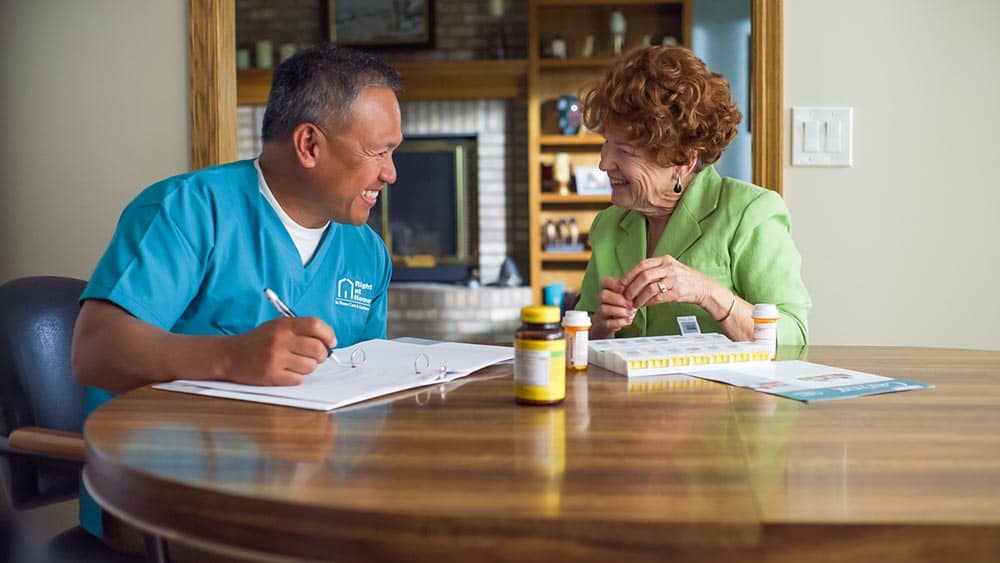

Tips for Managing Medications for Older Adults
Older adults taking multiple prescription medications face the challenge of managing them and dealing with potentially dangerous side effects and drug interactions. That’s where family caregivers, in concert with the senior’s primary care doctor and pharmacist, can help the senior stay on top of things.
Polypharmacy in the Elderly: A Growing Concern
Experts agree that most seniors don’t need to be on a large number of medications and thus don’t need to expose themselves to the increased risk of adverse drug reactions that come with polypharmacy or overmedication. It is common for a patient to experience a side effect from a medication, such as dizziness or constipation, and not realize or report it as an adverse drug reaction, so they are prescribed another medication to deal with the new symptom. In this way, a cycle or cascade effect can develop in which individuals find themselves on an increasing array of pills, some of which may not be necessary. A family caregiver familiar with a loved one’s ailments and which drugs they take can act as an advocate with the physician and pharmacist and thereby help their loved one avoid unnecessary pharmaceuticals, missed doses, and overdoses.
Tips for Managing a Senior’s Medications
Managing medications for an older adult takes planning, perseverance, and care. Here are some tips to consider if you are a family caregiver for an aging loved one:
Make a list and check it twice. The Health in Aging Foundation advises doing a thorough medication review. You can assist your loved one by making a list of all prescriptions and over-the-counter (OTC) products they take, including vitamins, supplements, and herbal remedies. The list should also include things such as medical patches, inhalers, injections, creams, and ointments.
Be organized. Once you’ve made a list, be sure it includes each item’s recommended dosage and frequency of use and what the medicine is intended to treat. Put the list in an easy-to-remember place and have it available for all health care professional interactions via phone or text and for all in-person visits. It is important to note that the list will only be as good and useful as how accurate and comprehensive it is.
Advocate with health care professionals. The next step is sharing the list with the primary care physician, pharmacist, and other health care professionals and asking the following questions about each item:
- What is it for?
- Is it necessary, given the senior’s personal health profile?
- How should it be taken (with food or on an empty stomach)?
- Is it safe to take it with other medications and OTC products?
- Should it be taken once a day, multiple times a day, or only as needed?
- What side effects might the senior experience?
- What dangers of adverse interactions are there if it is taken with other drugs and OTC products?
It is a good idea to write down the answers on the medication list in order to create a handy record that can be referred to as needed. Any changes can be noted and dated on the document.
Not all physicians include caregivers in decisions and instructions. If the family caregiver can’t be at an appointment, it can be easy for the older adult to feel overwhelmed and forget details that are given verbally. Sometimes, it’s unclear which medications are absolutes and which are optional. All of this can make it stressful for caregivers trying to get a handle on things. This is why the list of medications and the answers to the questions can become a valuable resource for the patient, caregiver, and any health care professionals involved in the chain of care. This information is important to share when the older person is hospitalized or seen by new physicians.
When traveling for any length of time, experts advise that seniors have with them a list of any medications they’re taking along with information on dosage, frequency, and who to contact for refills.
Consider a system to manage and track medications. To help keep the medication intake schedule organized and accurate, find a system that works well for you. Consider getting input from a physician or pharmacist on what works well for others. Medication management systems run from as simple as a pillbox to as complex as an automatic medication dispenser. The goal is to have a system that makes tracking medication use simple. Be advised, though, that such a system will only be as complete as the information the patient and physician provide.
Be proactive. When it comes to medications, it helps to start with the basics:
- Read and follow prescription directions. Surprisingly, many older adults do not take medications as indicated in the directions for use.
- Before a new medication is taken, ask why it’s being prescribed, what side effects are associated with it, and how it might interact with other things.
- An individual should not stop taking a medication without first consulting a doctor or pharmacist.
- Don’t assume or guess you know something; ask a doctor or pharmacist about it.
- If new or serious symptoms appear, check with a health care provider to see if the symptoms might be drug-related.
- Store all medications in a safe, easy-to-reach place; however, if small children are in the home, make sure the medications are out of their reach.
- Be sure to refill medications on schedule and dispose of any expired ones.
- Whenever an older adult gets prescribed a new medication, they or their caregiver should ask the physician if it’s appropriate for the senior’s age and health profile.
Be diligent. Doing due diligence is important because the American Geriatrics Society (AGS) reports that some medications may not be safe for older adults and, therefore, should be avoided or used with caution. Review the AGS criteria for potentially inappropriate medication use in older adults, which identifies medications that may pose greater risks than benefits for people age 65 or older.
Older adults are not immune from misusing prescription drugs. Opioids to treat pain can be especially addictive. Other prescription drugs seniors may misuse include barbiturates, stimulants, sedatives, and antianxiety and sleep medications. Controlled substances, such as alcohol and cannabis, can also pose a problem for some seniors. Caregivers who suspect an older adult of misusing a drug or controlled substance should start by expressing concern, without judgment, to the senior and encouraging them to discuss it with their doctor.
Overcome obstacles. Obstacles can get in the way of seniors taking medications properly, but there are easy solutions for most of them.
- If the trouble is tracking multiple medications and doses, a pill organizer or container is essential. A family caregiver can help set it up, along with a printed or online schedule to refer to. If the older adult in a caregiver’s charge ends up in a hospital or nursing facility, it’s important they have their pill organizer and medication list with them to ease the confusion of the new environment and perhaps new medications.
- If there’s difficulty reading or understanding directions on a label, a call to the doctor’s office or pharmacy can get the information shared by phone, text, or email.
- If there is trouble taking or tolerating a medication, discuss it with the prescribing physician or a pharmacist, who may have solutions.
- If struggling to open a medication container, ask the pharmacist to provide an easy-to-open one.
- If a fixed income is making a medication too expensive, search for drug company or government patient assistance programs online or ask the physician or pharmacist for affordable options or resources. A generic form of a brand-name medication may be a more affordable option. Check with the physician or pharmacist on the availability of a generic for any high-priced prescription. A generic may not always be an option, but it doesn’t hurt to ask.
How Right at Home Can Help
If a family caregiver feels overwhelmed, they can always consider professional in-home care services. In-home care services, such as those offered by Right at Home, can be important in the well-being of older adults who choose to age in place at home. Professional caregivers can drive seniors to the pharmacy or pick up prescriptions, give reminders to take medications, and alert families to possible side effects. Professional caregivers can also help clients maintain an all-around healthy lifestyle by providing nutritious meals, supervision during exercise, and companionship—all of which can lessen the need for certain medications. A professional caregiver can also be a source of respite for a family caregiver who needs time to rest and rejuvenate.
Use our office locator to contact the Right at Home office nearest you and speak to a senior care expert for more information.







